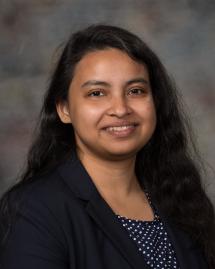
Dr. Shudipto Konika Dishari is an assistant professor at the Department of Chemical and Biomolecular Engineering at University of Nebraska-Lincoln (UNL) (2016- present). She was a post-doctoral fellow in Chemical Engineering (PI: Andrew Zydney), and Materials Science and Engineering (PI: Michael Hickner) at the Pennsylvania State University. Dishari graduated from the National University of Singapore with a Ph. D. in Chemical and Biomolecular Engineering.
Dishari’s research focuses on designing synthetic, bio-derived, and nature-inspired ion-conducting and light-harvesting polymers. Dishari explores the fascinating interfacial and nanoscale phenomena within polymeric confined systems. Her work targets to impact energy conversion/storage devices, chemobiosensing, and biomedical applications. Dishari has received several honors and awards in recognition of her innovative research, extraordinary teaching abilities, and academic promise, including: Department of Energy (DOE) Office of Science Early CAREER Award (2019-2024), National Science Foundation (NSF) CAREER Award (2018-2023), EPSCoR First Award (2017-2018), Nebraska Center for Energy Science Research Award (2020-2021), Baxter Young Investigator Award (2014), Henry Y. Kleinkauf Family Distinguished New Faculty Teaching Award (2020), and Harold and Esther Edgerton Junior Faculty Award (2019).
Dishari is an active organizer of symposiums in national meetings through platforms, like American Chemical Society (ACS), American Institute of Chemical Engineers (AIChE), American Physical Society (APS), and North American Membrane Society (NAMS). Dishari is members of UNL’s “Complete Engineering” initiative and “Diversity and Inclusion” Taskforce. Dishari is also a member of Nebraska Center for Materials and Nanoscience (NCMN)’s “Education and Outreach Committee,” and greatly involved in educating middle and high school students, including women, minorities and first-generation prospective college students.
